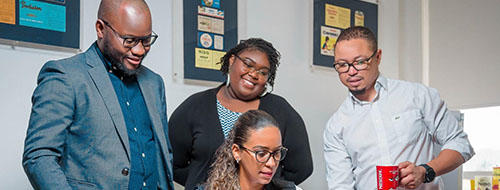In 2021, Nestlé East & Southern Africa Region (ESAR) joined forces with tech start-up Kudoti, waste buy-back centre, Destination Green, and waste reclaimers from Tembisa and together launched RE-Imagine Tomorrow, an ambitious waste management initiative. The project applies principles of the circular economy in tackling poor waste management, and has, over the last year, been developing a blueprint for an evolved waste management value chain. Key to this development is the multifaceted impact of empowering waste reclaimers, developing new markets for local businesses, recycling, and repurposing waste.
RE-Imagine Tomorrow was launched in September 2021, and the project analyses traditional waste management to explore innovations that improve the industry. Waste reclaimers typically collect waste to resell to waste buy-back centres at prices determined by bigger buy-back centres that have greater influence in the market. The impact of this dynamic has been that of tightly controlled pricing, and a limited range of collected waste. Further, this process generally has no consistently recorded data capturing the reclaimers, the waste they collected and the money they made. The informal nature of the entire value chain at the grassroots level made it difficult for all participants to innovate and grow. RE-Imagine Tomorrow is working on changing that, centering the waste reclaimers as the ultimate beneficiaries of this playbook in development.
In the playbook, RE-Imagine Tomorrow convenes technology, and community with corporate. Kudoti, provides the platform that enables the capturing of various data such as reclaimer profiles, date, type, and quantity of waste collected, and wages received. This creates a verifiable data track for every waste reclaimer involved in the project. In the long run, the data can help develop credit profiles for waste reclaimers and legitimise their occupation in the formal banking system, facilitating access to credit and other financial services from which they are currently excluded.
Destination Green convenes a community of waste reclaimers and buys collected waste from them. With eight centres across Tembisa, Destination Green’s reach enables waste reclaimers from across the neighbourhood, easy access to sell their wares. The data collection on Kudoti is done electronically, at the Destination Green centres.
Nestlé ESAR, as a corporate partner, has tasked the project with the collection of certain waste, especially plastic-related waste as part of the business’ waste management interventions. This has created a new market for Destination Green, allowing them to fairly gazette buy-back rates that are above average for the waste reclaimers. Nestlé ESAR has also made available additional incentives for top waste reclaimers every month, enabling them to increase their earnings further.
At the beginning of the pilot project, fifty waste reclaimers were participating in the project. Over and above the creation of waste reclaimer profiles, training is part of the pilot, ensuring that there is skills development for the waste reclaimers. Programmes include budgeting and personal finance, sustainability, and motivational talks from successful business owners in the waste recycling space. To date, an additional 100 waste reclaimers have been onboarded, making the total beneficiaries, 150.
Waste collected from the project has been processed in planet-friendly ways to make a composite material that is suitable for making all sorts of public furniture. Large outdoor compartmentalised recycling bins have been created from 80 tonnes of assorted plastic waste, and these have been installed in Nyiko Primary School, Moriting Primary School, Khula Sizwe Primary School, Ikusasa Comprehensive school, Arebaokeng community centre, and Ikhaya LoThando community centre in Tembisa. In total, the pilot has collected over 2,100 tonnes of waste, including cardboard, steel from food cans and mixed plastics.
Speaking on this milestone, Saint-Francis Tohlang, Corporate Communications and Public Affairs Director at Nestlé ESAR said, “Tackling waste management in communities requires strong partnerships, innovation and actionable efforts that deliver tangible impact. Through RE-Imagine Tomorrow’s data collection, training, and incentive scheme, we are demonstrating how REthink, REduce, REpurpose can be entrenched in our daily lives to improve waste management and safeguard our environment.”
For more information visit www.Nestlé-esar.com/RE
Contact:
Nestlé East and Southern African Region (ESAR)
Mota Mota
Head: External Communications
Tel: 072 206 9015
Email: [email protected]é.com
Issued by Weber Shandwick on behalf of Nestlé East and Southern Africa Region
Tankiso Motsoeneng
Tel: +27 61 374 7539
Email: [email protected]
About Nestlé
Nestlé is the world’s largest food and beverage company. It is present in 187 countries around the world, and its 291,000 employees are committed to Nestlé’s purpose of unlocking the power of food to enhance quality for everyone, today and for generations to come. Nestlé offers a wide portfolio of products and services for people and their pets throughout their lives. Its more than 2,000 brands range from global icons like Nescafé or Nespresso to local favourites like Ricoffy. Company performance is driven by its Nutrition, Health, and Wellness strategy. Nestlé is based in the Swiss town of Vevey where it was founded more than 150 years ago.
